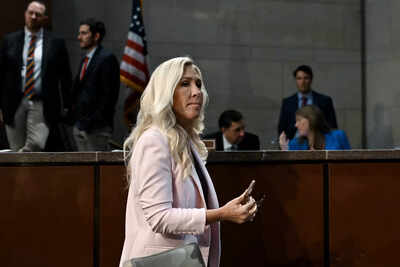“End Indian H-1B visas,” says Marjorie Taylor Greene. What this could mean for students and early-career professionals in the US

In a recent post on X, United Sates (US) Congresswoman Marjorie Taylor Greene called for an end to “Indian H-1B visas replacing American jobs.” The comment, shared on August 4, 2025, has drawn attention across student and professional networks, particularly among Indian nationals studying or working in the US.Greene’s statement does not signal a formal policy change, but it adds to the ongoing political debate around work visas and employment pathways for international talent in the US. The H-1B visa, which allows US employers to hire foreign workers in specialised fields, is widely used by Indian graduates after completing their education through student visa programmes.
What was said, and in what context
Marjorie Taylor Greene, a Republican Congresswoman representing Georgia’s 14th district, reposted President Donald Trump’s tweet that called for increased tariffs on Indian exports due to the country’s ongoing oil trade with Russia. Her repost included a separate message: “End Indian H-1B visas replacing American jobs instead”.This statement comes at a time of heightened trade tensions between the US and India, following Trump’s announcement that tariffs would be raised in response to India’s oil dealings. Though brief, Greene’s post is prompting reactions from tech workers, legal professionals, and student communities.It also adds to the broader national conversation around immigration, outsourcing, and the US labour market. With the 2024 presidential election cycle continuing to shape political discourse, topics like employment-based immigration and visa reform remain under close scrutiny.
Why Indian students and professionals are paying attention
India has long been the largest source of H-1B visa recipients. According to the US Citizenship and Immigration Services (USCIS), nearly 70% of H-1B visas approved in fiscal year 2024 went to Indian nationals. Many of these individuals begin their journey on F-1 student visas, later transitioning to Optional Practical Training (OPT) and applying for H-1B sponsorship.For current students and early-career professionals, the H-1B programme is often viewed as a critical bridge to gaining long-term work experience in the US. While Greene’s post does not introduce a legislative proposal, it reflects growing scrutiny in some political circles about how the programme is used.
No change in policy, but rhetoric matters
It is important to note that no new law or executive order has been introduced to restrict Indian H-1B visa applications. Greene’s post is a personal statement, not a formal measure. However, in a politically charged climate, such rhetoric can influence how immigration policy is discussed and potentially shaped.Recent discussions in Congress have included calls for increased transparency in the H-1B lottery process, stronger wage protections for domestic workers, and expanded pathways for Science, technology, engineering, and mathematics (STEM) graduates from US universities. Within that context, statements from elected officials, even when unofficial, can signal what themes may surface in future policy debates.
Where this leaves students and applicants in 2025
As of August 2025, students planning to study in the US or currently enrolled on F-1 visas remain unaffected. The Optional Practical Training (OPT) programme and H-1B application processes continue as usual. However, international students and recent graduates are encouraged to stay updated on official USCIS announcements and consult academic advisors or legal experts when planning for post-study employment.While Greene’s comment may not have immediate legal consequences, it reflects a viewpoint that could influence public opinion and future discussions on skilled migration. For Indian students and professionals navigating education and employment pathways in the US, staying informed and prepared remains essential.





